Steve Clemons of the New America Foundation and national security reform expert Jim Locher discuss how the chain of command that is described in the Goldwater-Nichols Act could be expanded to include inter-agency systems. Locher says that the White House is currently lacking an integrated effort between agencies that would allow departments to share expertise.
The Americas Archive
Free Newsletter

The term “lawfare” is increasingly used to characterize the pervasive role of law in the conduct of war, but there is nothing new about the concept. Law has always played a role in war, requiring that a pragmatic balance be struck between the necessities of war and the need to protect the innocent. The significance of this balance between military necessity and humane treatment under the law has never been more central to the credibility of U.S. military operations than it is today. The real question raised today is whether “lawfare” will come to define a fundamental distortion of this […]
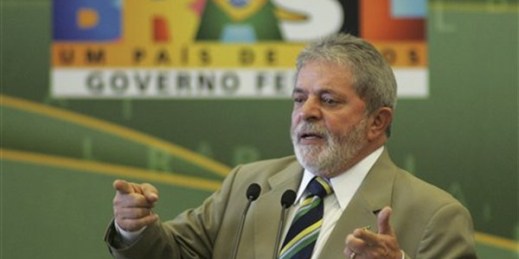
In recent years, Brazil has put forward a more ambitious foreign policy with the aim of expanding the country’s presence in global economic negotiations, multilateral institutions and regimes, and regional affairs. [1] An active presidential diplomacy has spearheaded this approach, concerned with simultaneously deepening ties with the industrialized economies and the emergent South. Relations have been reshaped with the United States and the European Union, ties have been deepened with China and India, South-South multilateralism has been renewed and an unprecedented presence in South America has been asserted. A diversified set of “external fronts” has also led to an innovative […]
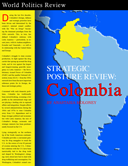
During the last five decades, Colombia’s foreign, defense and strategic priorities have been driven and determined by the country’s internal armed conflict, with the “War on Drugs” becoming the dominant paradigm from the 1980s onwards. This, in turn, has defined Colombia’s relations with Latin America — particularly, in recent years, with its Andean neighbors, Ecuador and Venezuela — as well as its relationship with the United States and Europe. Colombia’s struggle to stem cocaine production, its fight against the drug cartels that sprung up around the drug trade, and its war against the largest and longest-running guerrilla insurgency in Latin […]
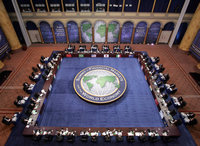
After two days of high-profile meetings and deliberation last week, the G-20 managed to make official something everyone already knew: the United States and Europe can no longer effectively manage the whims of the global economy on their own. To that end, the group reached consensus on two major fronts: 1) the more diverse G-20 should effectively replace the Western-dominated G-8 as the world’s primary economic coordinating body; and, 2) voting power within the IMF should be reformed to give greater voice to emerging powers. Stop the presses, right? Yes and no. This is big news, but not necessarily new […]
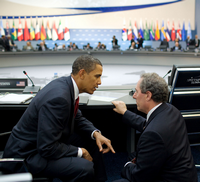
President Barack Obama’s performance at the United Nations last week was widely hailed — and condemned — as a clear departure from that of his predecessor, George W. Bush. His most telling statement spoke volumes about the limits of U.S. power in an interdependent world: “Those who used to chastise America for acting alone in the world cannot now stand by and wait for America to solve the world’s problems alone.” Subtext? Atlas has put down the heavy globe and has neither the intention nor the wherewithal to pick it up again. If that makes for an uncertain age, it’s […]
Poland has just announced its policy priorities for its EU presidency in 2011. And topping the list is EU defense, followed by energy security. Jean Quatremer claims it comes in response to the U.S. reversal on the missile defense system, and characterizes it as a “véritable révolution.” The former is certainly possible, even likely. I’m less convinced by the latter. As Laura Chappell pointed out in her excellent WPR Strategic Posture Review for Poland, EU defense has occupied an increasingly prominent position in Poland’s national security calculations. The reason being, Poland prefers being actively involved in any security architecture that […]
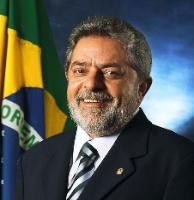
Brazil celebrated Independence Day twice this year: once on Sept. 7, the anniversary of its independence from Portuguese rule, but also a week before, on Aug. 31, when President Luiz Inacio Lula Da Silva declared the country “free” from poverty’s dominion, delivered by oil. President Lula’s “New Independence Day” accompanied his government’s announcement of a proposed overhaul of regulations governing the country’s oil and gas industry. The new regulatory model, Lula said, would “allow the government to become the owner of the petroleum.” Specifically, the proposal dealt with Brazil’s effort to increase its regulatory and fiscal control over the development […]

When the heads of state of the G-20 nations meet in Pittsburgh, Pa., later this week, it will mark nearly six months since the group’s previous meeting in London last April, and just over one year since the collapse of Lehman Brothers last September. At the time of the London Summit, the world was still in the throes of an unfolding crisis, leading the group to adopt a triage strategy. That amounted to essentially stopping the global economy and its credit markets from flat-lining. Accordingly, the major decision to come out of the April meeting was a $1.1 trillion global […]
President Barack Obama’s rollback of the European-based ballistic missile defense system is a strategic blunder that will incentivize Russian intransigence at the negotiating table, erode relations with loyal U.S. allies in Central and Eastern Europe, and ultimately place the American homeland at greater risk. The about-face stands in a long line of similar American miscalculations on Russia and its leaders. Famously misreading his Soviet counterpart, Joseph Stalin, President Franklin Delano Roosevelt once mused, “If I give him everything I possibly can and ask nothing from him in return, [he] won’t try to annex anything and will work with me for […]
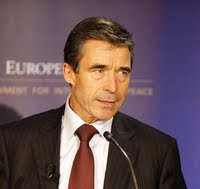
In his first major speech as the alliance’s new civilian head, NATO Secretary General Anders Fogh Rasmussen told an audience in Brussels that the time had come to revitalize security ties between Moscow and the Western alliance. Reflecting the speech’s hopeful title, “NATO and Russia: A New Beginning,” Rasmussen identified several possible areas for deeper collaboration. But the most newsworthy focus of his presentation was on ballistic missile defense (BMD). Rasmussen’s remarks came on the heels of U.S. President Barack Obama’s announcement the previous day that his administration would suspend the U.S. missile defense systems planned for Poland and the […]

The decision by the Obama administration to drop the missile defense plan in Eastern Europe was based on a revised perception of Iran’s long-range missile threat. The move is bound to have multiple and contradictory effects on the thorny issue of Iran’s nuclear program, which is slated to be a central subject of multilateral discussions at the opening of the U.N.’s General Assembly this week, as well as at the G-20 gathering in Pittsburgh days later. Diminishing the threat perception of Iran’s missile program from previous assessments under the Bush administration is certainly conducive to the IAEA — that is, […]
As somebody who spends his workdays evaluating investment opportunities in emerging/frontier economies, I receive a lot of business pitches involving new technologies. The time I spend listening to these accounts of how things can ultimately work out for the better balances my work in the national security realm contemplating how everything must “inevitably” collapse into conflict. I find the perspective it offers invaluable, because it reveals how often what we call “realism” tends to be hopelessly trapped in centuries past. Right now the bulk of the pitches I receive focus on alternative energy. No surprise there, but not for the […]
In this interview with Gary Thomas of Voice of America, CIADirector Leon Panetta says President Hamid Karzai will in alllikelihood still emerge as the winner of the presidentialcontest in Afghanistan, even after contested votes are thrown out.Panetta also says there aredifferences among Iran’s leaders about whether to actually build anuclear bomb, and he talks about the CIA’s reaction to the U.S.attorney general’s investigation into interrogation techniques.
Looks like Brazilian President Lula da Silva wasn’t far off when he joked that he’d end up getting the 36 fighter jets for free. Following Dassault and Boeing, Saab has now offered to make all the technology of its Gripen available, and to manufacture 40 percent of the aircraft’s components in Brazil. A Swedish deputy defense minister also announced that Sweden would sell the Gripens for just half the price of the competing aircraft. (You can check out the Rafale and Gripen promotional videos here in WPR’s newly revamped video section.) That means all three contractors have now met the […]
